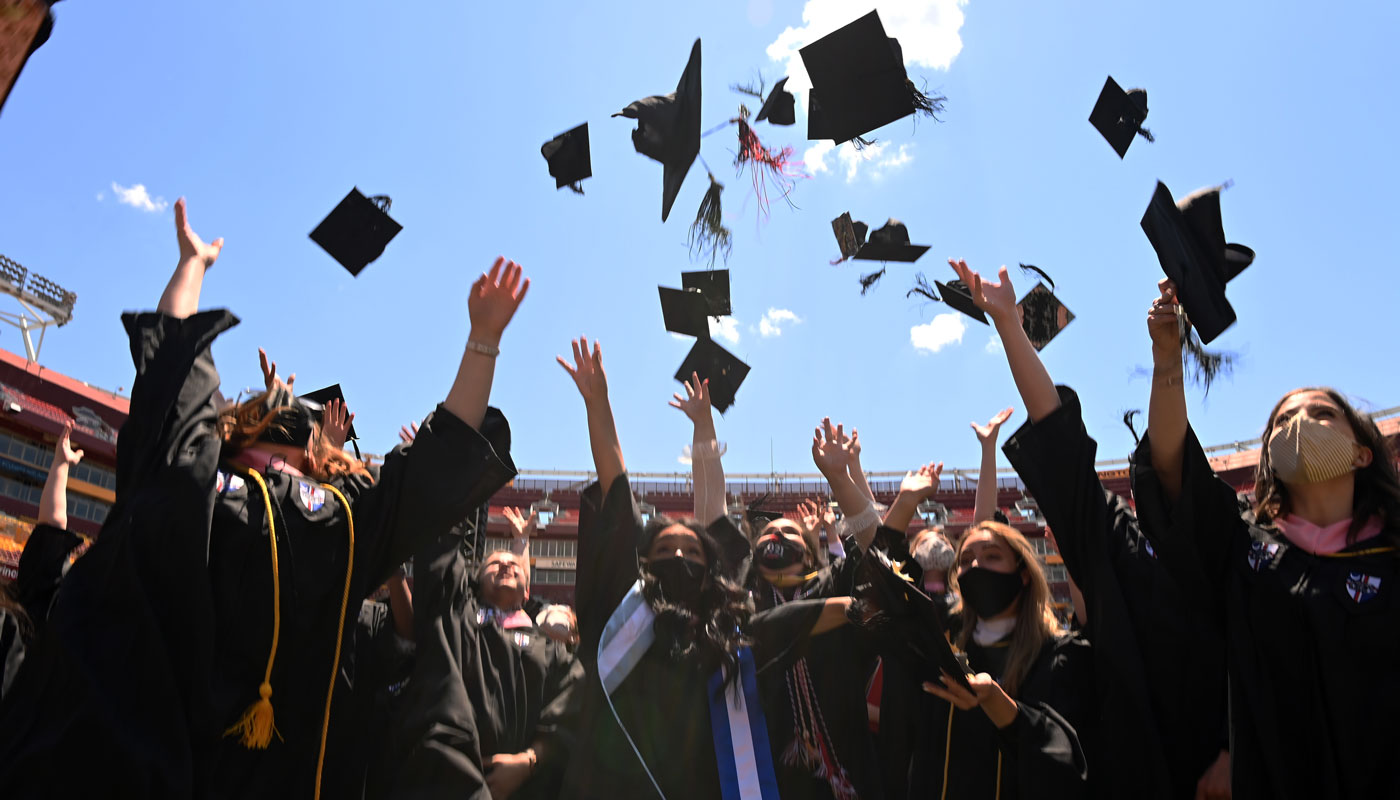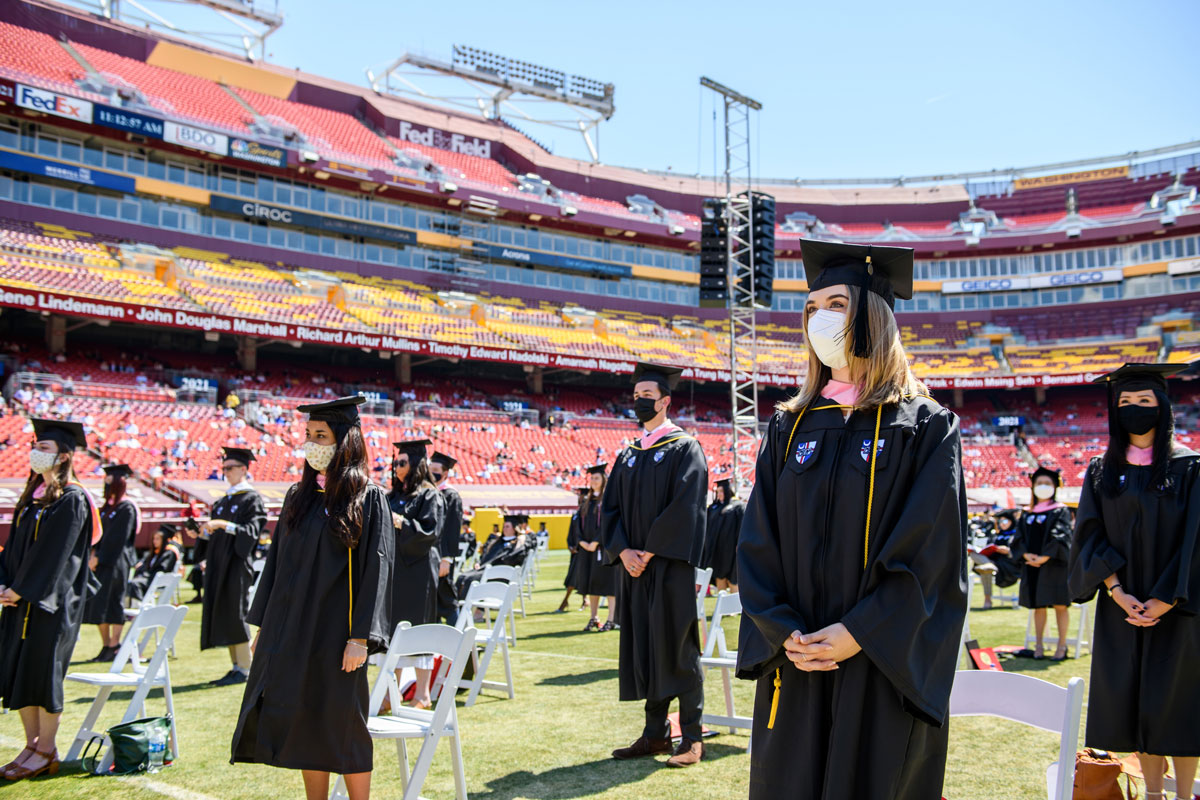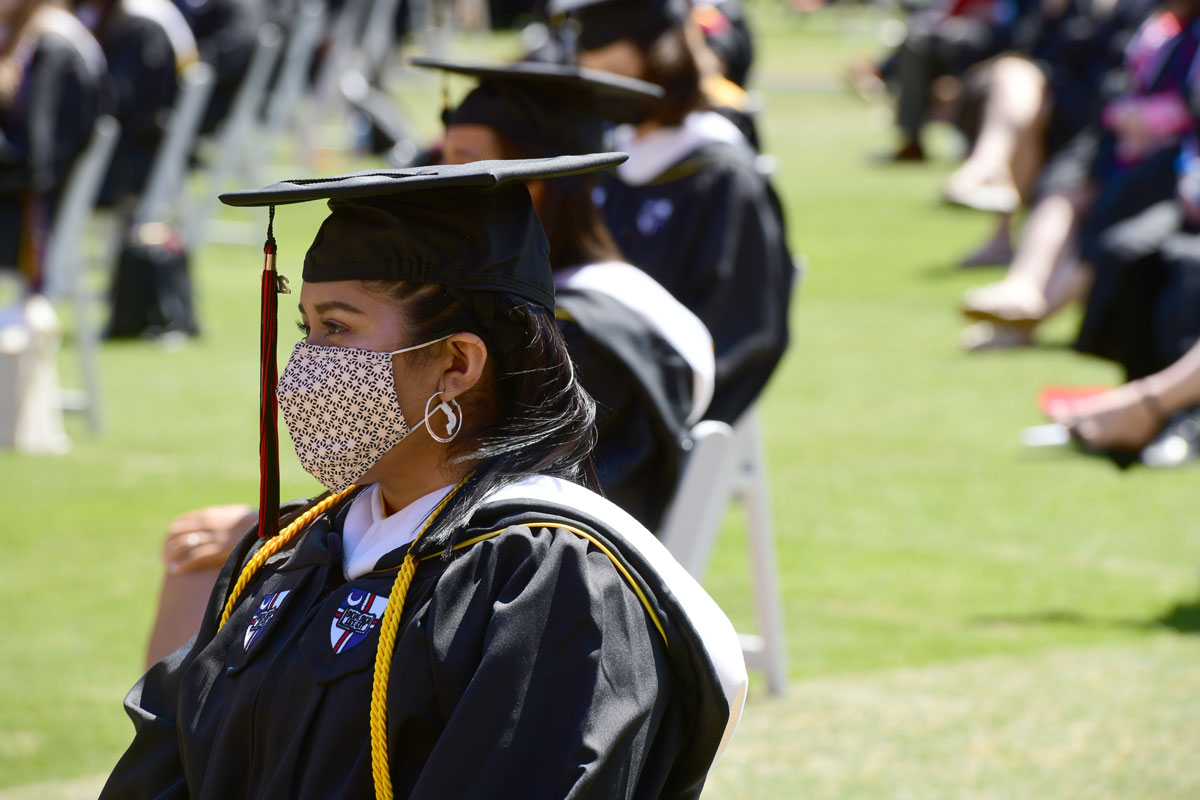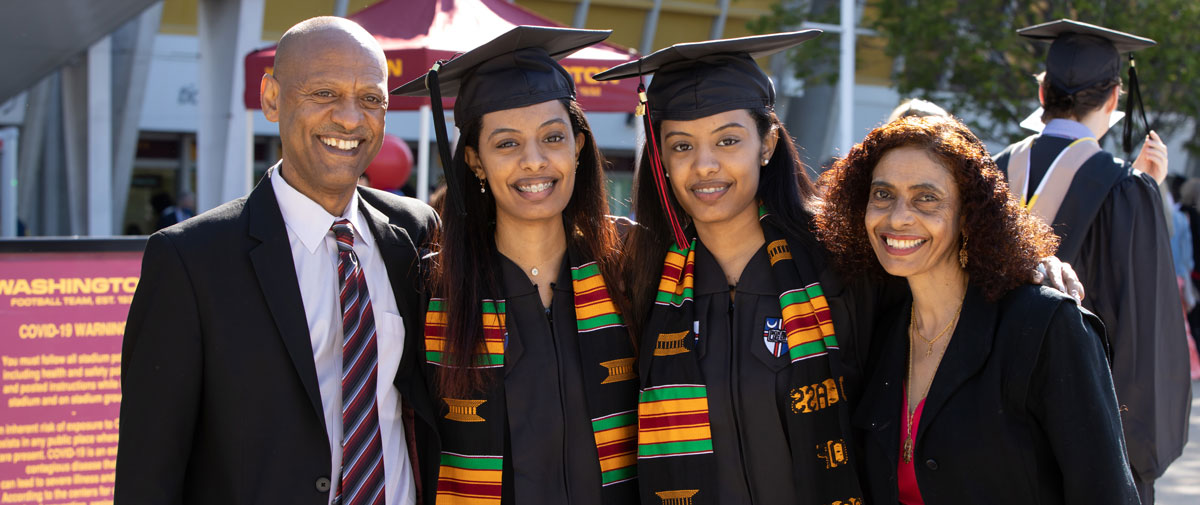

After a year of social distancing, virtual meetings, and limited capacity events, The Catholic University of America’s class of 2021 was finally able to celebrate together en masse during the 132nd Annual Commencement Ceremony, which was held at FedExField in Landover, Md., on May 15, 2021.
Traditionally, Commencement has taken place on the University Mall, facing the east portico of the Basilica of the National Shrine of the Immaculate Conception. This year’s change in location was necessary in order to secure a venue large enough to safely accommodate CatholicU graduates and their loved ones, while also allowing for sufficient COVID-related protocols such as social distancing.

Students sat in socially distanced seating directly on the football field where the Washington Football Team plays. Instead of a procession, the students' names scrolled around the stadium scoreboard. Thanks to the size of the new location, each graduate was permitted to invite up to four guests. The event was also livestreamed for those who could not attend in person.
New graduate Nellie Adams, who received her bachelor’s in theology, said she was thankful for the day’s event, even with the change in location. This past fall, she was working on campus as a student leader for first-year students, and she wasn’t sure if Commencement was going to happen.
“We’re so grateful for everyone who did this,” she said. “Having the Basilica background for our ceremony would have been nice, but this will be unforgettable.”
Among the students, faculty, and staff working to keep the day’s event running smoothly was Jennifer Paxton, professor of history and director of the University Honors Program. Remarking on the day’s location, she said it was “fitting that we’re ending this unique year in a unique way.
“When life hands you a challenge like this past year, you have to lean in and embrace the experience,” Paxton said. Referring to the University’s events team that organized the ceremony, she continued, “It took some people with vision and they had to work really hard to pull this off. The amount of work that went on behind the scenes to make this happen was amazing and they did it all for the students and their families.”
Shane MacDonald, special collections archivist for University Archives, was at the ceremony to receive his Master’s in Library and Information Science. As part of his work as an archivist, MacDonald has been collecting information about experiences of members of the University community during the pandemic. Now, he said, he was grateful to be living a unique moment in University history for himself.
“It’s not often you can say you’ve been to an NFL stadium for a graduation like this,” he said. “It’s such a unique venue that no other graduating class has experienced or will probably experience again. So in that sense, it’s very special.”
MacDonald said he was also grateful for an opportunity to be a part of a big celebration after a year of social distancing.
“This is my first real event in a year other than going to work or the grocery store,” he said. “This is a special way to ease back into the world, with a celebration after a year of all of us working hard and struggling to get to this point.”
The Commencement speaker for this year’s ceremony was William Chester Jordan, Dayton-Stockton Professor of Medieval History at Princeton University.

Jordan spoke of higher education as a “precious commodity” and shared the story of Robert of Sorbon, who was born to a peasant family in northern France in 1201. As a young man, Robert was extraordinarily brilliant, earning himself a scholarship position at the College of Rethel in Paris. After achieving great success as a student, he went on to study at the University of Paris and was appointed to the faculty, earning the renown and confidence of King Louis IX.
Never forgetting his own peasant background, Robert spent his life working to improve access to education for other students who had not been born to wealthy families. First he established an affordable boarding house for students who could not otherwise afford housing in the expensive Paris area. Later, he established a college as part of the University of Paris that would cater to the needs of poor folks from his region and others with few opportunities.
“The students there would appreciate opportunities offered to them that they had never before thought might be in their grasp,” Jordan said. “Amid these hopes and circumstances in the 1250s was born the greatest and most enduring of the Parisian colleges, the Sorbonne, named after Sorbon, the village where Robert was born.”
Jordan shared this story, he said, because it evokes memories from his own life, including parents who worked hard and sacrificed to send him to college and then, the value of higher education itself, which exposed him to new ideas and a deeper understanding of the human condition.
“As college was liberating for those students in 13th-century Paris I have spoken to you about, it was profoundly liberating for me. It made me, I believe or at least I hope, a more humane individual,” Jordan said. “You students, who are graduating in this exercise today, now have the benefits of so much learning ahead of you. Never ever forget how you acquired it, and I urge you to always strive, to the extent you can, to preach the beatitude of education to those young people whom you encounter throughout your lives.”

University President John Garvey delivered remarks about gratitude during the Commencement ceremony.
“Gratitude is not just an emotion,” he said. “We are always grateful for something — a sunny day, a loving family, an education. But in every case we are grateful to someone — to God, our parents, our benefactors.”
In practicing gratitude — including toward one’s own parents, Garvey said, graduates can learn to be more generous. “True gratitude moves us to practice the generosity we ourselves benefit from.”
New graduate Leo Nardo, who received his bachelor’s in mechanical engineering, said he was certainly thankful for the opportunity to celebrate his graduation with his family and friends.
“We finally made it and I'm happy that we have something to make it big and grand in the end,” Nardo said. “It’s great to catch up with friends, say your goodbyes, and celebrate all the work you did with your classmates. It’s a wonderful experience.”
In addition to Jordan, honorary degrees were presented to Pierre Manent, French political scientist and academic; Tommy Espinoza, president CEO and co-founder of Raza Development Fund, the largest Latino Community Development Financial Institution in the U.S.; Kathleen McChesney, former FBI executive assistant director and leading expert in addressing the Catholic Church’s sexual abuse and coverup crisis; and Joe Carlini, CEO at McKean Defense Group, 1984 graduate of Catholic University, and outgoing chairman of the Catholic University Board of Trustees.
— Katie Bahr, Assistant Director of Media Relations and Communications. Bahr can be reached at bahr@cua.edu.